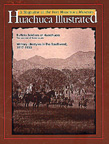 Huachuca
Illustrated, vol 1, 1993:
Huachuca
Illustrated, vol 1, 1993: Huachuca
Illustrated, vol 1, 1993:
Huachuca
Illustrated, vol 1, 1993:
chuca Illustrat
chuca Illustrat
Buffalo Soldiers at Huachuca:
Racial Awareness
chuca Illustrat
After the War the Regulars at Fort Huachuca, from their distant isolation, watched the press as the returning black veterans were cheered on the streets of New York and Chicago in 1919. Hopes were high in black communities for acceptance into the mainstream of American society. If Negroes could fight and die for their country, they thought, they could surely partake in a greater share of the American principles of equality and democracy. W. E. B. DuBois wrote in the September 1918 issue of The Crisis that black participation in the victory over Germany would hasten the victory at home for equal rights.
The Crisis says, first your Country, then your Rights!
Certain honest thinkers among us hesitate at that last sentence. They say it is all well to be idealistic, but is it not true that while we have fought our country's battles for one hundred fifty years, we have not gained our rights? No, we have gained them rapidly and effectively by our loyalty in time of trial.
Five thousand Negroes fought in the Revolution; the result was the emancipation of slaves in the North and abolition of the African slave trade. At least three thousand Negro soldiers and sailors fought in the War of 1812; the result was the enfranchisement of the Negro in many Northern states and the beginning of a strong movement for general emancipation. Two hundred thousand Negroes enlisted in the Civil War, and the result was the emancipation of four million slaves, and the enfranchisement of the black man. Some ten thousand Negroes fought in the Spanish-American War, and in the twenty years ensuing since that war, despite many setbacks we have doubled or quadrupled our accumulated wealth.(29)
Many of the African-American soldiers who fought in the war were cynical about the goals they were fighting for. A refrain surig by the recruits went: "Joinin' the Army to get free clothes; what we're fightin' 'bout nobody knows."(30)
A black lieutenant on the front told a New York Times correspondent why he thought he was there:
One of my men came to me several days ago ... and asked me why I had joined the Army. He reminded me that I was above the draft age and he wanted me to tell him what I was fighting for. I told him I was fighting for what the flag meant to the Negroes in the United States. I told him I was fighting because I wanted other oppressed people to know the meaning of democracy and enjoy it. I told him that millions of Americans fought for four years for us Negroes to get it and now it was only eight that we should fight for all we were worth to help other people get the same thing....
I told him that now is our opportunity to prove what we can do. If we can't fight and die in this war just as bravely as the white men, then we don't deserve equality with white men, and after the war we better go back home and forget about it all ... (31)
Their hopes would be dashed. The twenties were marred by race riots and lynchings, discrimination and segregation. But a new black social consciousness was being nurtured, one that would take forty more years to come into bloom. Men like Marcus Garvey with his "Back to Africa" movement and Father Divine, who was calling for black pride, provided rallying points. The widespread military experience had given confidence. Blacks were fighting back in greater numbers.
The black military experience provided a rallying point and wellspring of pride for black communities. Ulysses Lee wrote:
Concern with the pressing problems of the postwar period did not cause the Negro public wholly to lose sight of its relations with the armed forces. The Army and military life had long occupied a position of relatively greater concern and importance to the Negro public than to Americans in general. Soldiering had been an honored career for the few Negroes who were able to enter upon it. In the restricted range of economic opportunities open to them, the military life ranked high.... It was one of the few national endeavors in which Negroes had had a relatively secure position and which, at least in time of war, could lead to national recognition of their worth as citizens and their potential as partners in a common undertaking.(32)
The men at Fort Huachuca between World Wars, like First Sergeant Vance Marchbanks, could point to a growing record of valorous service to the nation and ponder why full citizenship was so vehemently denied. Marchbanks delivered a speech in 1927 to a convention of Sunday School teachers at McNary, Arizona, and eloquently called for equal rights for persons of all views and colors.
While the primary object of the soldier is to prepare for war, he realizes very seriously that the new patriotism has other duties than those of armed conflict; duties less splendid, but no less brave, requiring a bravery of a greater order. ... We will never be able to get what we want in this country until we are willing to organize and stand together as one man on things essential to the welfare of our people as a whole.(33)
His attempt to recruit soldiers for the "organized" fight against long-standing injustice would not be heard until the end of the next war when the discontent of the homecoming World War II African-Americans would evolve into the civil rights movement of the 1950s.
Footnotes:
30. Karsten, Peter, Soldiers and Society, Greenwood Press, Westport, Conn., 1978,18.